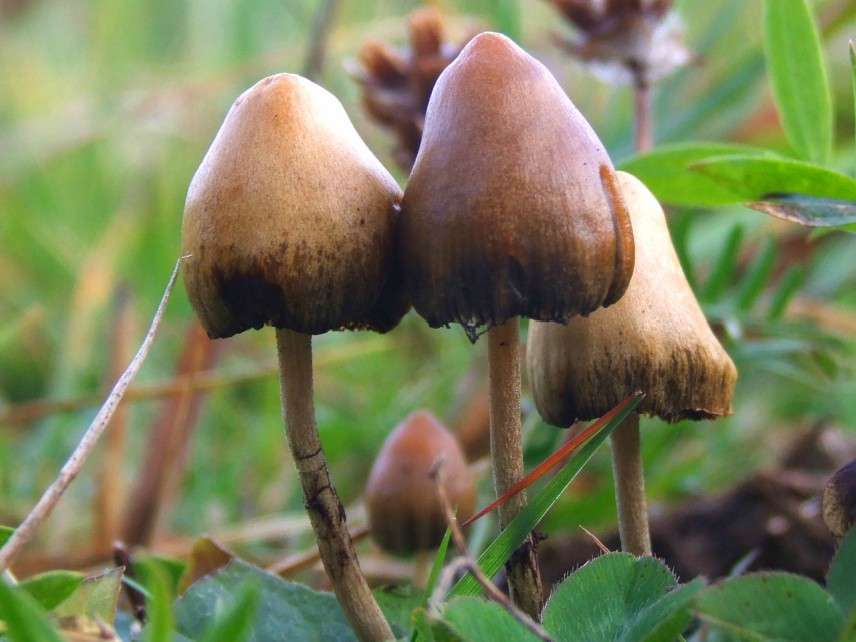FDA Recognizes Psilocybin As 'Breakthrough Therapy' for Depression
The designation could be a prelude to approving the forbidden psychedelic drug as a medicine.

The only reference to psilocybin on the Food and Drug Administration's website appears in the agency's Bad Bug Book: Handbook of Foodborne Pathogenic Microorganisms and Natural Toxins, where the psychedelic compound is described as a "neurotoxin" found in mushrooms. But according to the FDA, psilocybin is also a "breakthrough therapy" for major depression.
That designation, which the company seeking approval of psilocybin as a medicine announced this week, means "preliminary clinical evidence indicates that the drug may demonstrate substantial improvement over existing therapies." Based on that evidence, the FDA agrees to "expedite the development and review of such drug."
The FDA's dueling portrayals of psilocybin as a scary fungal neurotoxin and a promising treatment for depression are part of a broader story about forbidden drugs, including MDMA, marijuana, and LSD, whose benefits scientists are once again studying with government approval after decades of neglect. The rehabilitation of these substances, which may ultimately make them available as prescription drugs, is a far cry from the pharmacological freedom that libertarians favor. But it represents a welcome return to empiricism in an area of public policy long driven by irrational prejudice.
A preliminary 2016 study sponsored by COMPASS Pathways, a British life sciences company, found big improvements in a dozen subjects with "treatment-resistant major depression" who received psilocybin in a "supportive setting." After one week, their mean score on the Quick Inventory of Depressive Symptoms, which has a scale ranging from 0 to 27, had fallen from 19.2 to 7.4, a 61 percent drop. Most of that progress was still apparent at three months, when the mean score was 10, or 48 percent lower than the baseline. Last August the FDA approved COMPASS Pathways' plan for Phase 2 clinical trials, which will involve 216 subjects at 12 to 15 research sites in Europe and North America.
Psilocybin research involving patients with life-threatening illnesses has found even more dramatic psychological improvements. A randomized, double-blind study reported in 2016 found that cancer patients who received active doses of psilocybin experienced an average reduction of 78 percent in depression and 83 percent in anxiety, based on an evaluation six months after their sessions. A similar study reported at the same time found that psilocybin-assisted psychotherapy "produced rapid, robust and enduring anxiolytic and anti-depressant effects in patients with cancer-related psychological distress."
Like MDMA, which the FDA also has deemed a "breakthrough therapy" and may approve as a treatment for posttraumatic stress disorder as soon as 2021, psilocybin is a psychotherapeutic catalyst that is meant to be taken no more than a few times, as opposed to a mood-adjusting drug taken every day. The striking results of these studies suggest the former approach may hold more promise of substantial, long-term improvement.
"This is great news for patients," COMPASS Pathways Executive Chairman George Goldsmith said in the press release announcing the FDA's "breakthrough therapy" designation. "We are excited to be taking this work forward with our clinical trial on psilocybin therapy for treatment-resistant depression. The FDA will be working closely with us to expedite the development process and increase the chances of getting this treatment to people suffering with depression as quickly as possible."
If the FDA does approve psilocybin as a medicine, the drug will have to be removed from Schedule I of the Controlled Substances Act, which is supposed to be reserved for drugs that have no accepted medical use. In a 2018 Neuropharmacology review, Johns Hopkins psychologist Matthew Johnson and three co-authors argue that psilocybin should be placed in Schedule IV, which is for medically useful drugs with a relatively low abuse potential. They conclude that "psilocybin appears to offer potential benefits to patients and little risk to public health."


Show Comments (32)